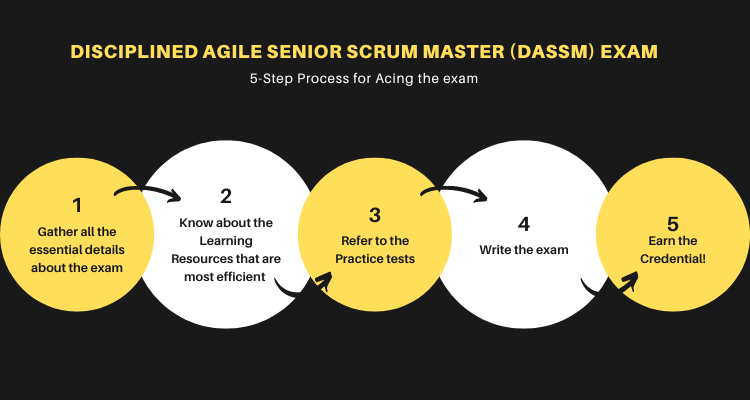Disciplined Agile Senior Scrum Master (DASSM) is a certification and training program offered by the Disciplined Agile (DA) Consortium. The program is designed for agile professionals who want to enhance their knowledge and skills in Scrum and agile methodologies.
DASSM certification focuses on the role of the senior scrum master, who is responsible for promoting and supporting agile practices within an organization. The program covers topics such as team building, coaching, and facilitation, as well as advanced Scrum practices and methodologies.
Disciplined Agile Senior Scrum Master (DASSM) Exam Glossary
Here are some important terms and concepts that may be included in the Disciplined Agile Senior Scrum Master (DASSM) exam glossary:
- Disciplined Agile (DA): A hybrid agile framework that provides guidance and tools for implementing agile practices in an organization.
- Scrum: An agile methodology for managing and completing complex projects. It emphasizes iterative development and self-organizing teams.
- Agile Manifesto: A set of values and principles for agile software development that emphasizes individuals and interactions, working software, customer collaboration, and responding to change.
- Lean: A methodology that focuses on optimizing the flow of work and eliminating waste.
- Kanban: A lean method for managing and improving work flow. It uses visual signals to indicate when work should be started or stopped.
- DevOps: A set of practices that combines software development and IT operations. It aims to increase the speed and efficiency of software delivery.
- Continuous Integration (CI): A practice of regularly integrating code changes into a shared repository. It helps detect and resolve issues early in the development process.
- Continuous Delivery (CD): A practice of continuously deploying code changes to production. It helps reduce the time and effort required to release new features.
- Agile Scaling: The process of adapting agile practices to large, complex projects or organizations.
- Product Backlog: A prioritized list of features or requirements for a product or project. It is used in Scrum to guide the development process.
- Sprint: A time-boxed iteration in Scrum. It typically lasts 1-4 weeks and includes planning, development, testing, and review activities.
- Retrospective: A meeting at the end of a Sprint to reflect on the team’s performance and identify areas for improvement.
Disciplined Agile Senior Scrum Master (DASSM) Exam Guide
To prepare for the DASSM exam, the official resources provided by DA are:
- Disciplined Agile Senior Scrum Master (DASSM) Exam Preparation Guide: This guide outlines the key concepts and objectives of the DASSM exam and provides links to various resources that can help you prepare. You can find this guide on the DA website at https://disciplinedagileconsortium.org/DASSMExamPrepGuide.
- Disciplined Agile Senior Scrum Master (DASSM) Exam Outline: This outline provides a detailed breakdown of the exam content, including the number of questions, exam format, and the topics covered. You can find this outline on the DA website at https://disciplinedagileconsortium.org/DASSMExam.
- Disciplined Agile (DA) Scrum Master (DSM) and Senior Scrum Master (DASSM) Study Guide: This guide provides an in-depth review of the DA framework, agile principles, and the Scrum Master role in a DA context. You can purchase this guide on the DA website at https://store.disciplinedagileconsortium.org/products/disciplined-agile-scrum-master-and-senior-scrum-master-study-guide.
- DA Scrum Master (DSM) and Senior Scrum Master (DASSM) Sample Exam Questions: These sample exam questions provide a way to test your knowledge of the DA framework and the Scrum Master role. You can find these sample questions on the DA website at https://disciplinedagileconsortium.org/DASSMExam.
- DA Scrum Master (DSM) and Senior Scrum Master (DASSM) Practice Exam: This practice exam provides an opportunity to simulate the actual DASSM exam experience and test your readiness. You can purchase this practice exam on the DA website at https://store.disciplinedagileconsortium.org/products/disciplined-agile-scrum-master-and-senior-scrum-master-practice-exam.
It’s important to note that these resources are the official ones provided by DA, and other third-party resources may not accurately reflect the exam content or format. Good luck on your exam!
Disciplined Agile Senior Scrum Master (DASSM) Exam Tips and Tricks
Preparing for the Disciplined Agile Senior Scrum Master (DASSM) exam can be challenging, but with the right approach, you can increase your chances of success. Here are some tips and tricks that can help you prepare for and pass the exam:
- Understand the DA framework: The DASSM exam is based on the Disciplined Agile (DA) framework, so it’s essential to have a solid understanding of the framework and its core concepts.
- Practice Agile principles: The DASSM exam is designed to test your ability to apply agile principles and values in a variety of situations. Take the time to practice agile principles in your day-to-day work and reflect on how they can be applied in different contexts.
- Know the Scrum Master role: The DASSM exam focuses on the Scrum Master role in a DA context, so it’s essential to understand the responsibilities and duties of a Scrum Master.
- Review the exam outline: The DASSM exam outline provides a detailed breakdown of the exam content and the topics covered. Review the outline thoroughly and make sure you understand each topic and how it relates to the DA framework and the Scrum Master role.
- Take practice exams: The DA Scrum Master (DSM) and Senior Scrum Master (DASSM) Practice Exam is a great tool to help you prepare for the exam. Take practice exams to identify your areas of strength and weakness, and focus your study efforts accordingly.
Course Outline
These are the major testing criteria for the exam –
Team Development for high performance teams 14%
- Describe the Tuckman Team Development Model
- Determine team development at each stage of the Tuckman team model
- Solve problems at different stages
Emotional intelligence for high performance teams 10%
- Define emotional intelligence
- Explain each component of emotional intelligence
- Identify why one should create psychological safety and embrace diversity
Tactical scaling in complex situations 6%
- Explain the significance of agility in an organization
- Determine how to scale agility
Removing Impediments 22%
- Describe the Disciplined DevOps layer
- Use the DA toolkit to solve challenges in the DevOps layer
- Optimize the delivery with the “test-first” method as it relates to the quality of requirements
- Determine the criteria for what “done” might look like
- Describe the value stream layer in the Scope of DA diagram
- Use the DA toolkit to solve challenges in the value stream layer
Coordinating and collaborating across teams 10%
- Explain the Coordinate activities process goal
- Identify how to improve the value creation structure of teams
- Use the DA tool kit to optimize the flow of work and solve challenges related to coordinating and collaborating across teams
Conflict management for high performance teams 12%
- List examples of when conflict can be healthy
- Explain the Thomas-Kilmann Conflict resolution model
- Demonstrate how to use healthy and unhealthy language to solve a conflict
Pragmatic Planning and Reporting 26%
- Describe the concept of sufficient planning
- Define the five levels of scope including who focuses on each
- Determine how to solve a planning problem using the Release Planning goal diagram
- Explain how organizations and teams approach metrics
- Explain what types of measurement work or do not work
- Explain how to choose and design specific metrics to measure improvements against areas related to team performance that need improvement (GQM, OKRs)
- Demonstrate how to solve a measurement problem using the Govern Delivery Team goal
Let us now jump to the main point of the article –
Disciplined Agile Senior Scrum Master (DASSM) Study Guide
Here are some of the resources that you can refer to when you start preparing for the exam –

Learning Resource 1 – Exam Content Outline
It is critical that you thoroughly review the course outline in order to better prepare for the exam. It is critical to base your strategy and learning curve on the course outline and areas that require additional attention. Furthermore, familiarizing yourself with the exam course makes the PMI Disciplined Agile Senior Scrum Master Exam Preparation easier:
Learning Resource 2 – Online Community
Joining online forums and study groups is a great way to gain knowledge and see where you stand in any competition. You can solve equations with other competitors and stay motivated here. Not only will the exposure help with exam preparation, but you will also be able to get all of your questions and doubts answered here.
Learning Resource 3 – Online classes and Instructor-led training
To clear the concepts and develop a strong understanding, you can also refer to PMI Training Online and online classes. Because the person taking the exam has prior project management experience. He is completely prepared for the exam’s practical aspects. More emphasis should now be placed on the theoretical aspect, which can be strengthened by receiving expert training or classes from a reputable organization. Enrol in a formal study course provided by a PMI chapter or a Registered Education Provider (R.E.P.s).
Learning Resource 4 – Evaluate with Practice Tests
Finally, as they say, practice makes perfect. The more you practice, the better you’ll get. There are several free Disciplined Agile Senior Scrum Master practice tests and online tests available on the internet. Solving them will not only familiarize you with the exam environment and boost your confidence but will also assist you in identifying areas where you are lacking and need to pay special attention to. However, it is critical that you select an authentic and up-to-date practice test. So begin your quest for success here.
Let us now look at why you should choose this certification –
Why get DASSM certified?
Disciplined Agile, which lays the groundwork for business agility, brings together various activities; such as solution delivery, enterprise architecture, portfolio management, security, finance, and vendor management to deliver the best business outcomes. Organizations with high agility report more projects meeting original goals and business intent than organizations with low agility using the same approaches (Source: PMI’s Pulse of the Profession 2018).
Top organizations around the world are hiring Scrum Masters, with a 67 percent year-on-year increase in job listings (LinkedIn, 2020); including Google, Amazon, Walt Disney, LinkedIn, Polaris Laboratories, Roche, BBC, ExxonMobil, Verizon, Walmart, Dow Jones, and Tesla. These world-class organizations have adopted the Disciplined Agile approach to accelerate business agility for shorter time-to-market, higher quality, improved employee morale, and transformation into truly adaptive organizations.
Improve your Scrum Master skills by earning the PMI Alliance Disciplined Agile Senior Scrum Master certification, and you’ll be able to take advantage of the high demand across industries.


